Not only is choosing a responsible breeder in your own and your new four-legged family member’s favor, it also ensures that you do not support unqualified breeders and puppy mills who are doing this for all the wrong reasons and bringing unhealthy Doodles into the world.
So what do you need to look out for in a breeder? Here are the most important boxes your breeder should check!
Ask Questions and Do Tons of Research to Find a Responsible Breeder
You’ll probably be doing some research before finding a pup you want to take home. Well… some is not enough. Do lots and dig deep!
When you’ve decided on which Doodle you’d love to make your family member, make sure to look into all the main health issues that breed might have. This way you’ll be able to detect the early warning signs that might indicate how the pup has been bred. We’ll cover health testing later on in this post.
Furthermore, before and when you get in contact with a breeder, carefully look through their website, try to find information from the outside sources (reviews, testimonials, etc.) and, of course, ask them tons of questions.
Here are some very important questions that you should ask the prospective breeder:
- What are your goals and purpose for breeding dogs?
- Can you explain to me how you comply with responsible breeding practices?
- Do you line breed? (See “Other Considerations” below for more information)
- Is breeding your full-time job? (See “Other Considerations”)
- Were the parents (Golden Retriever/Poodle) bred within AKC standards? (See “Other Considerations”)
- How many litters will the mom produce until she’s retired? (See “Other Considerations”)
- Where are the puppies raised?
- Do you have permits with animal services?
- Can I see references from past puppy clients?
- What early socialization/training does the puppy have while with you?
- Do you socialize the dogs so they’re exposed to both adults and children?
- What experience do you have with raising/training dogs?
- What experience do you have in producing structurally sound puppies?
- What is the expected size of this puppy?
- What are some best training methods for this puppy?
- What are the health problems in the breed, and what can be done to prevent or control them?
- What health tests have been completed on the parents?
- What health tests will be done on the prospective puppy, and when?
A responsible breeder has no problem making sure you have all the information that you need, no matter how silly or serious your questions seem. They should also be happy to provide references from past puppy buyers.
Mutually, you should also expect a breeder to ask questions about you, your lifestyle, and your family. For reputable breeders, it is important that they are able to determine what kind of home you have to offer one of their puppies.
If the breeder doesn’t respond to your questions, or if they don’t seem to show any interest in the life the puppy will lead with you, keep looking. A responsible breeder cares about the well-being of their puppies and is committed to making a good match.
Well-being and Proper Environment
A huge red flag is when the breeder won’t let you see the home where your new Doodle is being born and raised. If that’s the case, run fast and find a new breeder!
However, when visiting the kennel or home of the breeder, keep your eyes open for the overall condition of the environment.
Is it clean? Is it safe? Do they have enough food and water? Are they being properly taken care of? Does the breeder give their dogs enough attention and affection?
These are all important questions to which you should get an answer.
Likewise, ask to meet the puppy’s parents to see if they’re in good health.
Testing, Testing and More Testing
A puppy (and its siblings) with a good health history is your best guarantee that you are starting off with a healthy puppy for the long term. In fact, health testing was the number one concern when people were asked in a poll:
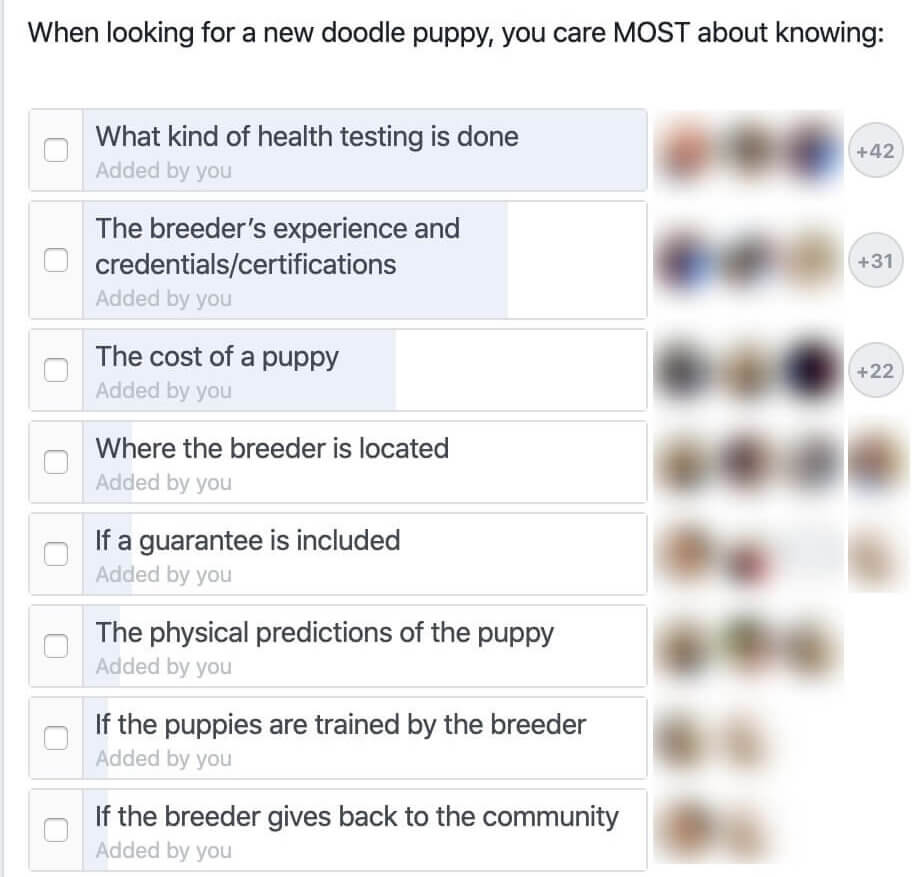
Testing starts from the pup mamas and papas – a responsible breeder will make sure that the dogs are healthy before breeding new pups. By the way, ask for proof and results of health testing.
Although it is crucial that a vet is performing regular checkups, this alone is certainly not enough to ensure that the dog parents don’t have any genetic diseases that can be carried on to puppies.
So What Testing Should You Be Looking Out For?
- Hip, elbow and patellar luxation testing – hip and elbow dysplasia are common hereditary diseases, which can cause major concerns for your puppy later in life. Your breeder should be able to provide a PennHIP or OFA certified proof. For patellar luxation, you’ll be looking for the OFA certificate.
- Eye disorders – ask for proof of annual CERF eye testing or clearance by a canine ophthalmologist, and DNA based PRA (progressive retinal atrophy) testing that’s been done by OptiGen or HealthGene.
- von Willebrand’s disease aka vWD – this hereditary disease indicates problems with blood clotting that can cause life threatening blood loss even from small wounds. vWD can be discovered by a DNA test and you should ask for VetGen or Cornell University clearance.
- Heart health – breeding dogs should be checked for cardiac clearance yearly. Again, you’ll be looking for the OFA certificate or heart clearance by a canine cardiologist.
- Thyroid – thyroid malfunctions are another common issue that doodles are prone to. Ask for proof of thyroid clearance with the OFA certificate or Dr. Dodds thyroid testing.
Moreover, your breeder should be able to provide a minimum of a two-year health warranty (reimbursement guarantee) for your new pup. You won’t be able to detect genetic diseases until after a few years of age. Make sure that you carefully read your contract with the breeder and feel comfortable with all the conditions.
Other Considerations on Choosing a Responsible Breeder
Line Breeding
You may prefer to go with someone who does not line breed. Line breeding is when closely related dogs are mated together to get closer to a specific genetic make-up, qualities, or conformation. In other words, line breeding is a form of inbreeding.
AKC Standards
While Doodles aren’t an AKC acknowledged breed, both the Golden Retriever and Poodle are. You may prefer to go with a breeder who has carefully selected both parents and the line should begin with dogs that are AKC registered, or were at least bred to the standard.
Overbreeding the Females
We need to be mindful of the well-being of the parents, especially the mama. Avoid breeders who overbreed their females. Look for someone who does not have a girl produce too many litters in a year, and retires a girl after a certain amount of litters, no matter what.
Transparency
Open, fluid and transparent communication with the breeder from day one should be high on your list of what to look for. Quick communication is lumped in with this.
Transparency includes pictures and videos of the parents so buyers see and know the parents’ temperaments and personalities. It also includes photos and testimonials from previous litters.
A website and Facebook page offer transparency, as does communication with previous buyers/owners.
Full-Time Breeders
You may want to consider working with someone who is dedicated to breeding dogs full-time rather than anyone who calls themself a hobby breeder or does this as a “side business”.
Location
There are Doodle breeders everywhere, so consider finding a responsible, dedicated, respectable breeder within driving distance. Flying a puppy across the country can be traumatic for the dog and is otherwise unnecessary to begin with.
Arbitrary Stipulations for Warranty Voiding
Be aware that some breeders may stipulate that your puppy’s health warranty will be voided for arbitrary reasons.
For example, they might say a warranty will be voided if you ever feed the dog a brand of food that is different than what they recommend or sell on their website.
It’s pure speculation, but a theory is that because most people will not feed one brand of food exclusively for the first 2 or 3 years of the puppy’s life, it will automatically make it so the breeder doesn’t have to be held liable for anything they guarantee.
Another example could be something like if your puppy ever gets groomed a certain way, then the warranty will be voided.
Both these examples feel very arbitrary and we haven’t found anything online to legitimize these kinds of stipulations. It’s a very sneaky way for a breeder to claim a breach of agreement and void the warranty as a result.
To conclude, choosing a responsible breeder starts with being responsible yourself. Do your research, ask as many questions as possible and don’t let yourself be fooled by false promises. After all, if you’re lucky, you’ll be spending 15 years with your new little friend and you want to make sure those years are as best as they can be.
If you’re looking to add a Doodle to your family soon, check out our breeder directory to find a Doodle breeder near you.
Learn How to Care for Your Doodle Puppy!
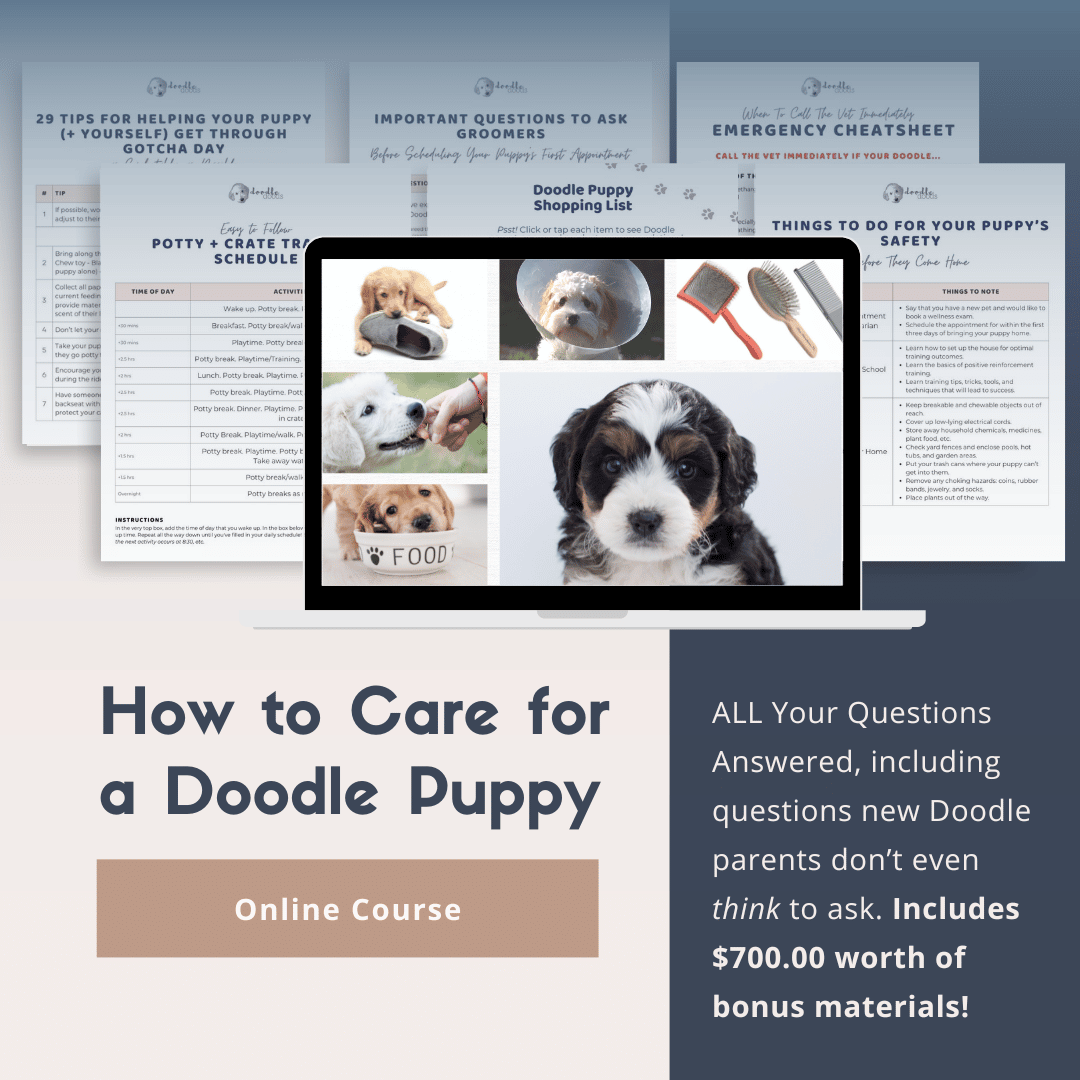
Perfect for first-time Doodle parents, get ALL your questions answered, including questions new Doodle parents don’t even think to ask.
Plus, get $700 worth of Bonus Materials for FREE, including:- Doodle Parenthood Community and Support Group ($190 value)
- Doodle Puppy Growth Tracker ($20 value)
- EMERGENCY Cheatsheet: When To Call The Vet Immediately ($50 value)
- HELP! Button ($145 value)
- And SO MUCH MORE!

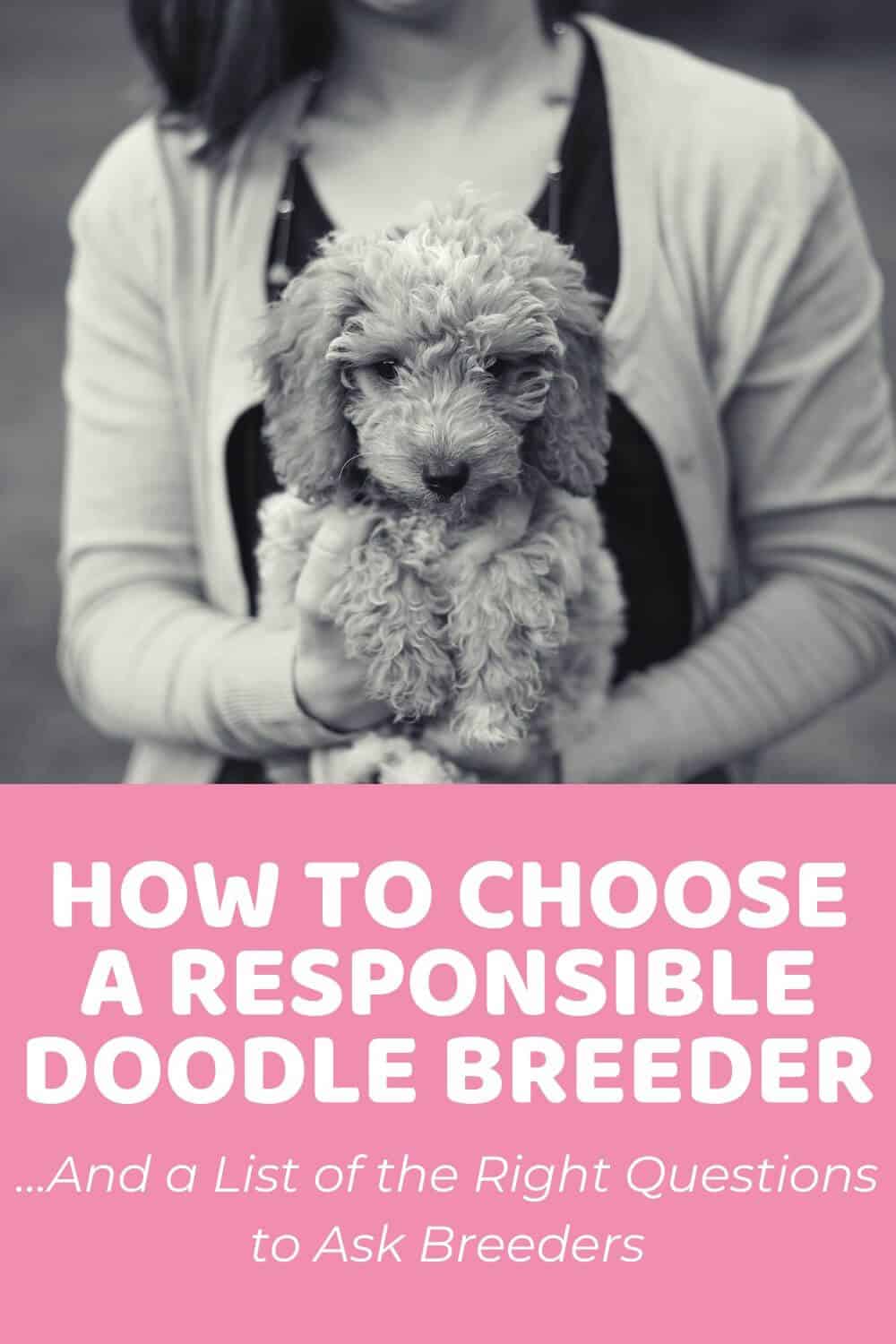
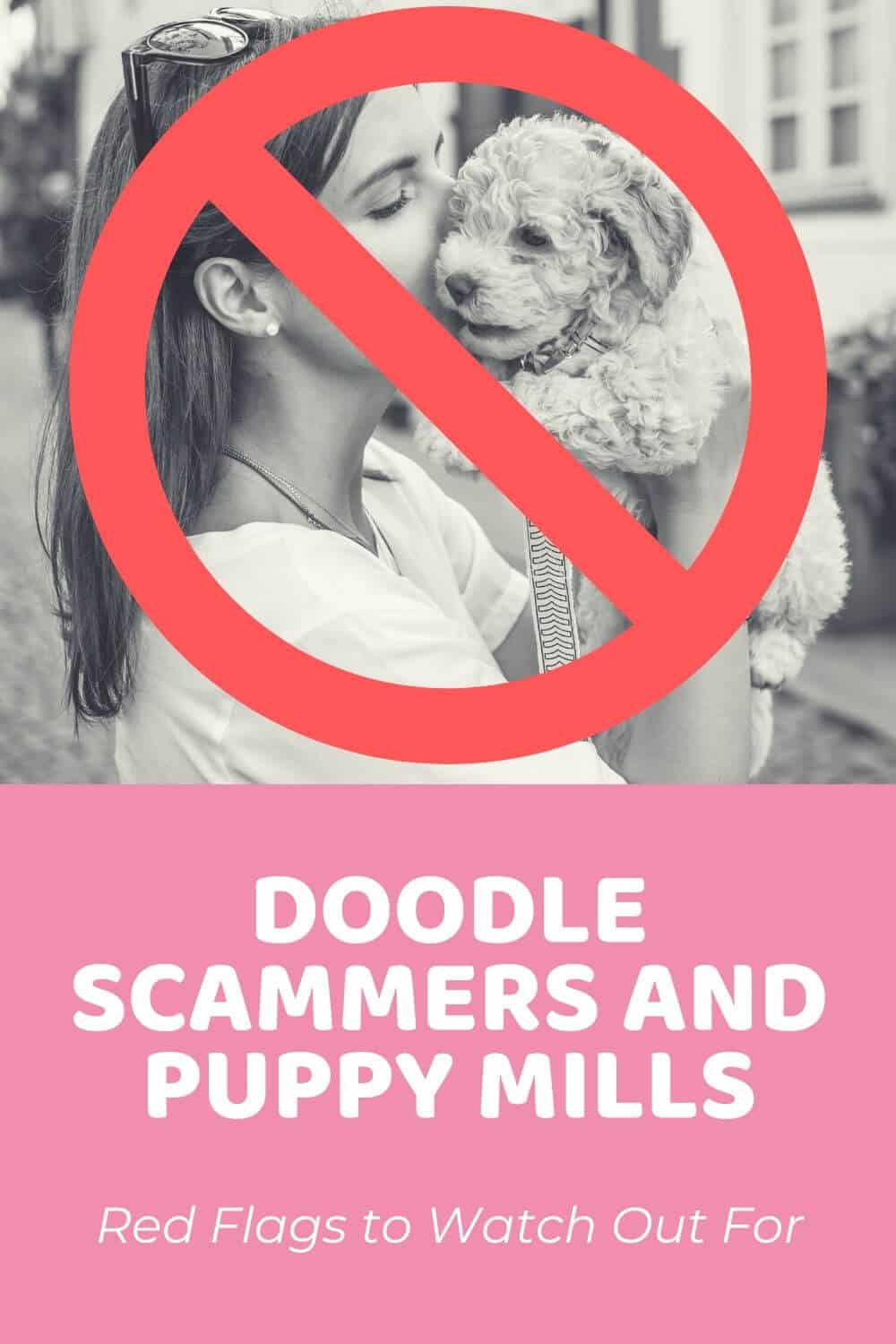



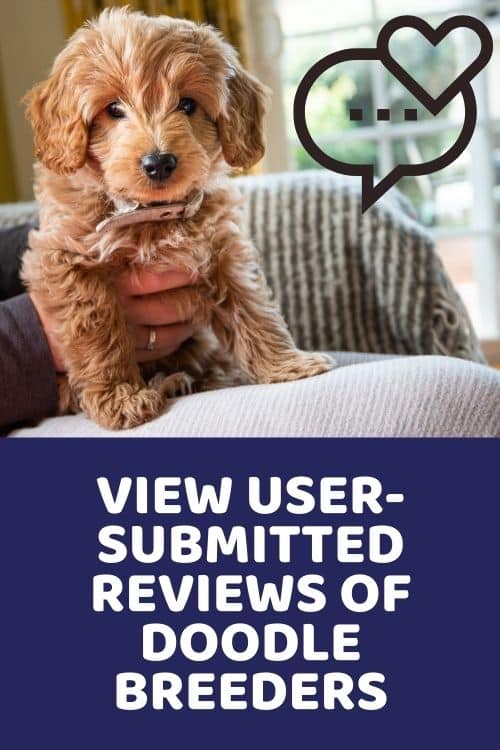
Thanks for mentioning that you should inquire from a breeder what their purposes and goals are for breeding canines. My brother is considering looking for an American bully breeder because he’s thinking of surprising his daughter with a puppy for her birthday. I think it’s wise for my brother to contemplate buying a dog from an esteemed professional that has strong and healthy puppies.
August 26, 2020 at 2:36 pm